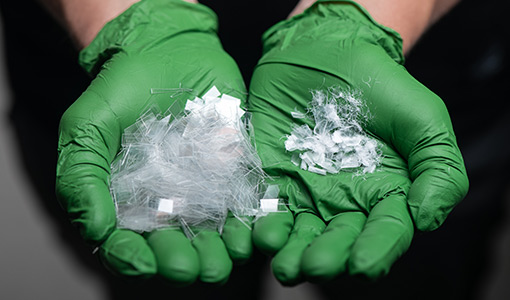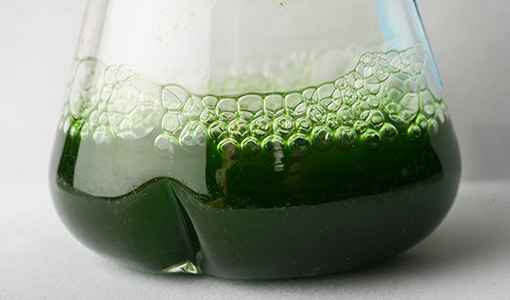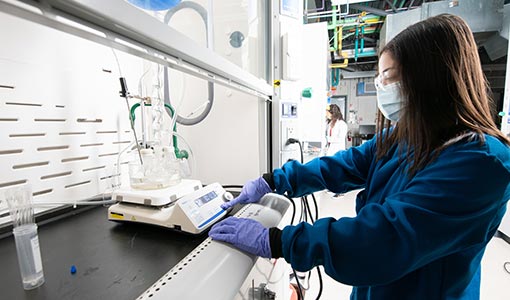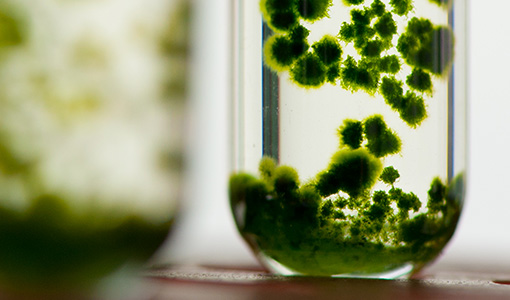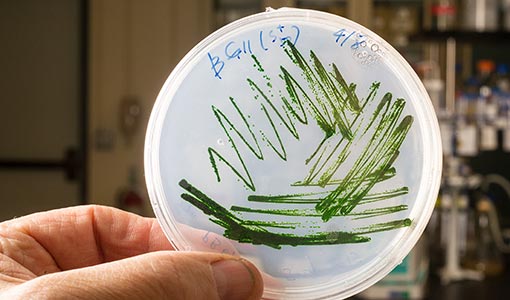Explore our collection of new stories for this topic.
Search or filter for a specific story using the options below.
March 2022
Amazon Joins NREL-Led BOTTLE Consortium To Help Change the Way We Recycle
A new collaboration between Amazon and NREL-led BOTTLE Consortium could be a major step toward developing solutions to global plastic pollution.
Research Team Advances Biological Alternative to Producing Common Petrochemical
Engineers have dreamed of programming organisms to sustainably produce ethylene, a chemical nicknamed "king of petrochemicals" for its importance in plastics. Now, one pathway to this petrochemical is nearing reality, via a photosynthetic bacterium that is genetically specialized to turn sunlight and carbon dioxide into ethylene.
Q&A With Meredith Doyle: Impatient To Save the World
As part of the Q&A profile series "Manufacturing Masterminds," Meredith Doyle discusses her perspectives on the future potential for plant-based plastics, equity issues surrounding plastics pollution, and more.
February 2022
NREL Bioengineering Process Prepares To Make a Splash
When Americans turn on a faucet, they rely on public treatment systems to ensure the water is safe to drink. Recently, Mars Materials was granted an option for an exclusive license to use NREL's renewable acrylonitrile technology in producing polyacrylamide flocculants for commercial use in water treatment systems.
Beyond Fossil Carbon? Green Electricity Is Opening Doors to Low-Emission Alternatives for Making Fuels and Chemicals
Petroleum, coal, and natural gas are not the only starting points for making fuels and chemicals. In fact, growing supplies of renewable electricity open exciting new doors for making identical products at potentially a fraction of the climate cost.
Can We Fix Recycling?
Three NREL teams win prestigious REMADE awards to remake recycling, improve manufacturing, and build a circular economy.
A Metabolic "Traffic Map": Machine Learning Lets Scientists Plot Complex Flow of Compounds Through Microbes
Like traffic signals controlling cars through the center of town, microorganisms use metabolic signals to control the flow of energy and nutrients.
January 2022
Plant-Based Epoxy Enables Recyclable Carbon Fiber, Improves Economics for Mass Market Electric Vehicles
Ten times stronger than steel, nearly half the weight of aluminum, far stiffer than fiberglass—carbon fiber carries a package of advantages, making it a preferred material for use in luxury sedans and Formula One racecars alike.
DOE Launches AlgaePrize for Student Innovators—Competition Will Culminate at NREL in Spring 2023
A new competition from the U.S. Department of Energy's Bioenergy Technologies Office encourages students to imagine and develop innovative technology solutions using algae as a potent and flexible energy resource.
December 2021
Forget Sci-Fi—This NREL Biotechnology Could Actually Help Colonize Mars
NREL scientists are working on harnessing cyanobacteria to convert growing concentrations of CO₂ in Earth's atmosphere into the same chemicals currently made from petroleum and natural gas—a step toward decarbonizing the chemical industry. With partner Nzyme2HC, they are exploring whether astronauts can use NREL's patented ethylene-emitting cyanobacteria to manufacture building materials and produce oxygen on Mars.
Share
Last Updated May 5, 2025

